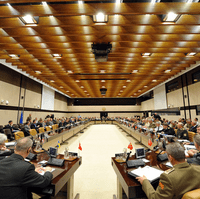MITROVICA, Kosovo -- Back in 2003, when U.S. officials optimistically predicted that American forces would be "greeted as liberators" by the Iraqi people, their minds probably conjured images of the mass euphoria that welcomed NATO troops to Kosovo in 1999. During that war, cheering Kosovar Albanians chanted "NATO, NATO!!" as the U.S.-led military force entered the territory after pushing out Serbian forces with a 78-day bombardment.
A NATO-led peacekeeping force known as KFOR has remained here ever since, helping the fledgling country get on its feet. But NATO, facing demanding commitments in Afghanistan and potentially elsewhere, is itching to pull out of Kosovo. This raises the basic question of whether Kosovo can survive without KFOR, or even with a sharply reduced NATO presence, which now seems the most the alliance will provide.
KFOR troops from more than 30 different countries dot the landscape in Kosovo. Their olive-green vehicles patrol the roads; their camouflage-uniformed soldiers, with patches showing the flags of their country of origin, walk the streets and stand guard at potential flash points. Their presence acts as a deterrent to potential troublemakers and serves as a constant reminder that peace here is fragile.

